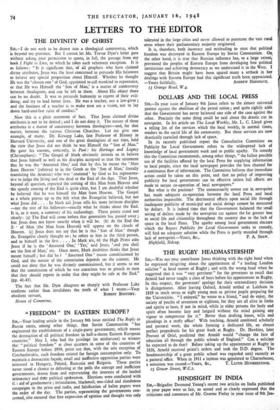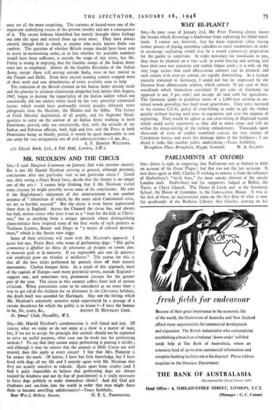HINDSIGHT IN INDIA
Snt,—Brigadier Desmond Young's recent two articles on India published in your paper were so fair, so sound and so clearly expressed that the criticisms and comments of Mr. Graeme Finlay. in your issue of 9th Jan-
nary are all the more surprising. The currents of hatred were one of the important underlying causes of the present trouble and not a consequence of it. The recent hideous bloodshed has merely brought these feelings out into. the open and stirred them up even more. They have always existed, though held in check, as anyone who really knows India can confirm. The question of whether British troops should have been sent to assist in maintaining order, or in fact whether the available numbers would have been sufficient, is outside the scope of this letter, but Mr. Finlay is wrong in implying that the Gurkha troops of the Indian Army were not so employed. Almost all the Gurkha Battalions of the Indian Army, except those still serving outside India, were in fact moved to the Punjab and Delhi. Even their recruit training centres stopped most of their work and sent detachments of every available man to help.
The reduction of the British element in the Indian Army already made and the plan for its ultimate elimination altogether had, before 14th August, 1947, begun to destroy the impartiality of the Indian soldier which not unnaturally did not endure when faced by the very powerful communal factors which would have profoundly stirred peoples infinitely more phlegmatic than the Muslims, the Hindus and the Sikhs. The failure of Field Marshal Auchinleck, of all people, and his Supreme Head- quarters to carry on the control of an Indian Army working in both Dominions proved, only too conclusively, that, with the attitude of the Indian and fakistan officials, both high and low, and the Press in both Dominions being so blindly partial, it would be quite impossible to run one army for two antagonistic sets of civil administrations.—I am, &c.,



































 Previous page
Previous page